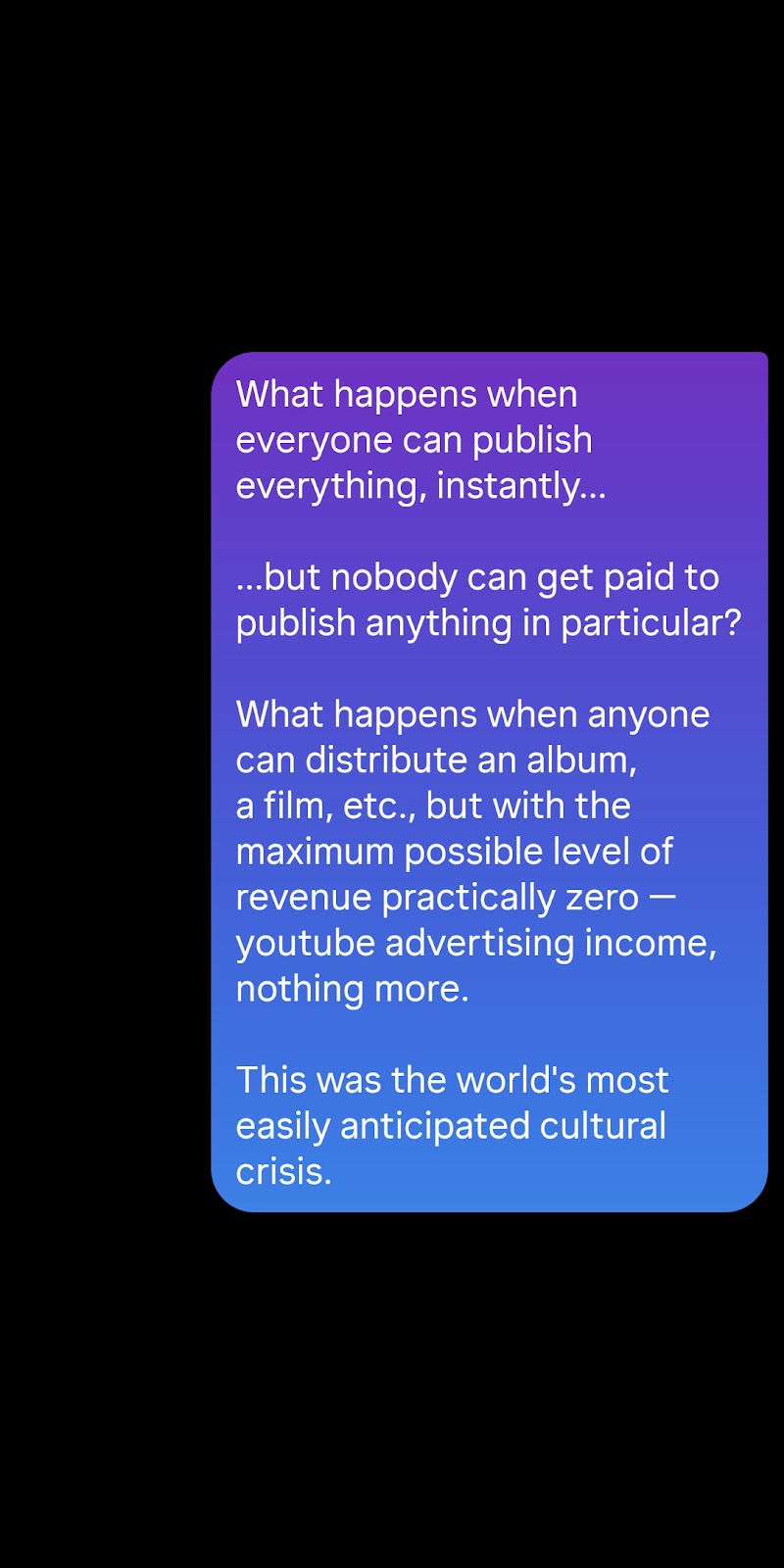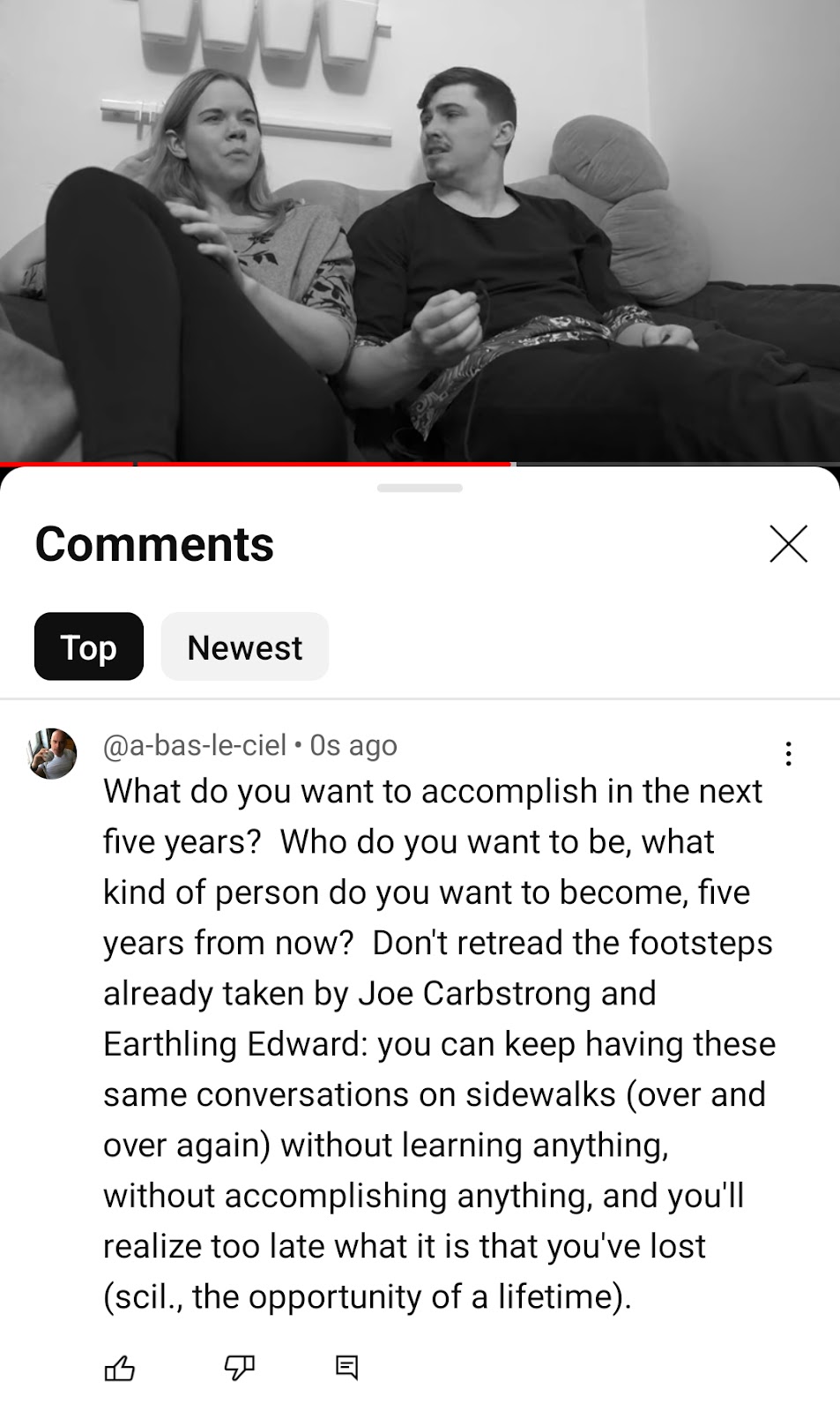Thursday, 29 February 2024
Wednesday, 28 February 2024
Sunday, 25 February 2024
A revolution wasted on the revolutionaries.
On ostensible motivations: money, fame, power, respect, sex.
This is not a bad trait, on your part, but you need to become more accustomed to dealing with the division between ostensible motivations and actual motivations:
even within a demimonde as obviously artistic and altruistic as rap music, ONLY A MINORITY OF PEOPLE really care about rap music itself, whereas some people are just trying to make money, just trying to get laid —some people are literally trying to deal cocaine (etc.) and the significance of the music is tertiary.
The same could be said —sadly— about stand up comedy (cocaine dealers, whoremongers, etc.).
Why did my father get involved with Communism?
Why did he get involved with Hinduism and (before that) so called "Christian existentialism"?
Perhaps for the same reasons he struggled to become an actor at the Stratford festival (a small town in Canada).
It would be jejune to meet my father at any one stage of his life and think, "This man has a sincere interest in the study of Hinduism", or the study of Communism, or anything else.
Some people do: some people's ostensible motivations really are the same as their "occult" motivations, shall we say.
It's rare.
For the most part, you're looking at that overly familiar list of motivations again and again: money, fame, power, respect, sex. Not necessarily in that order.
Even in Cambodia, even in Laos: people ostensibly doing humanitarian work.
It's pathetic, but it's the damn truth.
I've taken advanced (400 level) courses in the philosophy of Plato: I'm the only person in the room interested in Plato. I've been in political science classes: not a single other person there is interested in politics. Even the classes I took in Cree, as a language: nobody else wanted to learn Cree. I never met anyone else interested in the politics of Asia/China in a whole university program devoted to that subject.
That's my experience. And now I'm meeting people via a polyamory dating app (where I describe myself as a dissident intellectual, vegan and nihilistic atheist, etc.) because this youtube channel utterly failed to bring even a single colleague into my life.
Friday, 23 February 2024
Socrates of New Orleans.
Socrates started out in the agora. Ended up in prison with a bottle of hemlock. I ain't playing that Socrates game by those Socrates rules. Socratic method is overrated. Even at Harvard.
If you want to live in imitation of Socrates, don't forget the way in which he died.
Wednesday, 21 February 2024
The Spirit of Season Three.
Tuesday, 20 February 2024
Tattoos and swords: being perceived as dangerous is better than being perceived as innocuous.
—————
My advantage (and disadvantage) in life is that people find me terrifying: this is partly "intellectually intimidating", but it's partly some other type of fear —several other types of fear, perhaps.
Interesting. Do you have much success with that?
Depends on what you mean by success.
A lot of people perceive me to be a genius, in a lot of different contexts.
Not a lot of people want to work with me. Not a lot of people want to help me.
Being perceived as a talented, handsome genius is better than being perceived as an untalented, ugly moron.
Being perceived as dangerous is better than being perceived as innocuous.
I have never had the impression that men who are "more approachable" have better lives than those who are intimidating and unapproachable. And we're talking about people being intimidated by my intellectual and ethical qualities: they're not intimidated because I'm great at basketball, etc.
^ We're living through a period of history in which wealthy and highly educated men get covered with tattoos (even facial tattoos) in an attempt to be MORE intimidating. Is this more or less civilized than the 18th century aristocrat, who would swagger around wearing a sword, ready to challenge anyone to a duel over a point of honor, etc.
E.M.
On the self-evident stupidity of Sam Bankman-Fried: cultural implications.
Torn from the comment section.
[Eisel Mazard:] The only mystery is how this guy convinced anyone that he was of above average intelligence: SBF has never said a single word in an interview that sounded wise, witty or even sharp.
[samuhlm2:] hes going to have haters for obvious reasons, but if you don't think it takes above average intelligence to go to MIT, work at Jane St, start a business doing crypto arbitrage at a time most people weren't aware of crypto and navigating banking which still is a pain to figure out, then launch an exchange that was worth billions and was a household name... no one of average intelligence could do that. What is your business? He got caught with his hand in the cookie jar and tried to explain his way out of it because consequences werent a thing to him and that was his mistake. Had he just kept his mouth closed from the jump this would have been much different. Once it got to the point it did that hes going on these shows trying to do damage control of course he didnt look intelligent there was nothing of substance to discuss. But you're a fool if you dont think it takes brains to get to where he got.
[Eisel Mazard:] I taught myself two languages (one ancient, one modern) while chopping firewood and doing humanitarian work in Northern Laos: you're wrong about SBF, and you're never going to know how wrong you are. No, cryptocurrency isn't hard to understand: ancient Chinese philosophy is (especially if English is your first language) and understanding the political implications for modern China, etc. I've met brilliant people in many different walks of life: no, SBF did not show greater than average intelligence in anything he ever said about the banking system, investment or cryptocurrency himself (and I have heard him speak for many hours).
[BlackNapoleon:] @eiselmazard i dont know who this guy is but he has to be above to fool billionaires, hedge fund investors and more etc, your sitting here at 600 subscribers and probably 42 years old. Even I as a teenager can see it.
[Eisel Mazard:] It was very, very obvious that Sam did not understand high school economics when he was questioned about how his own business worked. I do not mean that as some kind of hyperbolic exaggeration: i mean that as a genuine, reasonable assessment. He genuinely did not understand general principles of (macro and micro) economics, as well as failing to understand the specific concepts underpinning his own business (and this was evident in (i) interviews, (ii) courtroom cross examination but also (iii) casual conversations he'd had "on the record").
Re: "your [sic] sitting here at 600 subscribers and probably 42 years old." The self-identified teenager in this conversation is demonstrating the real problem here: deep commitment to "the just world fallacy". He demonstrates the unshakable assumption that someone who has money and fame is wise, whereas someone who has neither money nor fame must be a fool: this attitude is at least _less prevalent_ in some cultures rather than others. Why you'd expect me to become rich and famous when studying poverty in Laos and Cambodia, I cannot say, but (in fact) I've managed to get over seven million views on youtube talking about my life: does that number "credit" or discredit" me? If anything, you should be more skeptical because of my (relative) popularity: seven million mouseclicks are really not a reason to take what I have to say more seriously.
Sunday, 18 February 2024
Civilization is ours to redefine: following up on "the civilizing mission" discourse, etc.
[A reply to a supporter on Patreon.]
This is not the model of "civilizing discourse" that I am proposing or asserting —and you may well have already noticed this, already understood this, etc., from my videos, but I will explain it (briefly) anyway.
I do think that any individual can assert his or her own notion of what is civilized: if you think it is civilized to grow dandelions as beautiful flowers, therefore (for you) they are not weeds to be exterminated but —instead— something beautiful to be cultivated. You could also be cultivating dandelions intentionally, as something edible, I note —as they are (as a matter of scientific fact) edible, although most people don't eat them.
I knew a man (I will leave him unspecified) who thought that it was very important to REFUSE to use pesticides in raising crops on his own property, but he accepted (by the same token) that when he made jam out of his own berries his jam would contain a significant quantity of crushed up insects. For him this was civilized, for someone else uncivilized (i.e., wouldn't it be more civilized to use pesticides and then NOT eat bugs?).
In Thailand, obviously, I was surrounded by white men who thought it was perfectly civilized to pay money to sleep with prostitutes who really had no common language with themselves: however dehumanizing prostitution may be when everyone speaks the same language, the situation of (e.g.) a Burmese refugee (teenager) in Thailand having sex with a European man is several degrees MORE dehumanizing (in the absence of any common language, etc.). I have met men who thought it was perfectly civilized for an intellectual to sleep with prostitutes under these circumstances.
My suggestion is that each of us asserts (and fights for) his or her own notion of what is civilized —often in contrast to one's own father's notion of what's civilized, one's own brother's notion of what is civilized, etc.
So, implicitly, I am not asserting a model in which there is only one right answer: the average attendee of Coachella has a very different notion of civilization from the average Saudi Arabian —and both may be wrong in different ways, and to a different extent, from my perspective. However, yes, there are (ultimately) criteria of right and wrong: brain damage (via drug use) and cutting off part of your own body (e.g., circumcision) are clearly wrong —and yet a huge number of people accept them as civilized.
[I should add the example of cousin marriage, i.e., something perceived as civilized by a huge percentage of the world's inhabitants, but that —as a matter of objective fact— results in diminished brain capacity for successive generations, as well as higher rates of truly horrific (genetic) disabilities.]

















